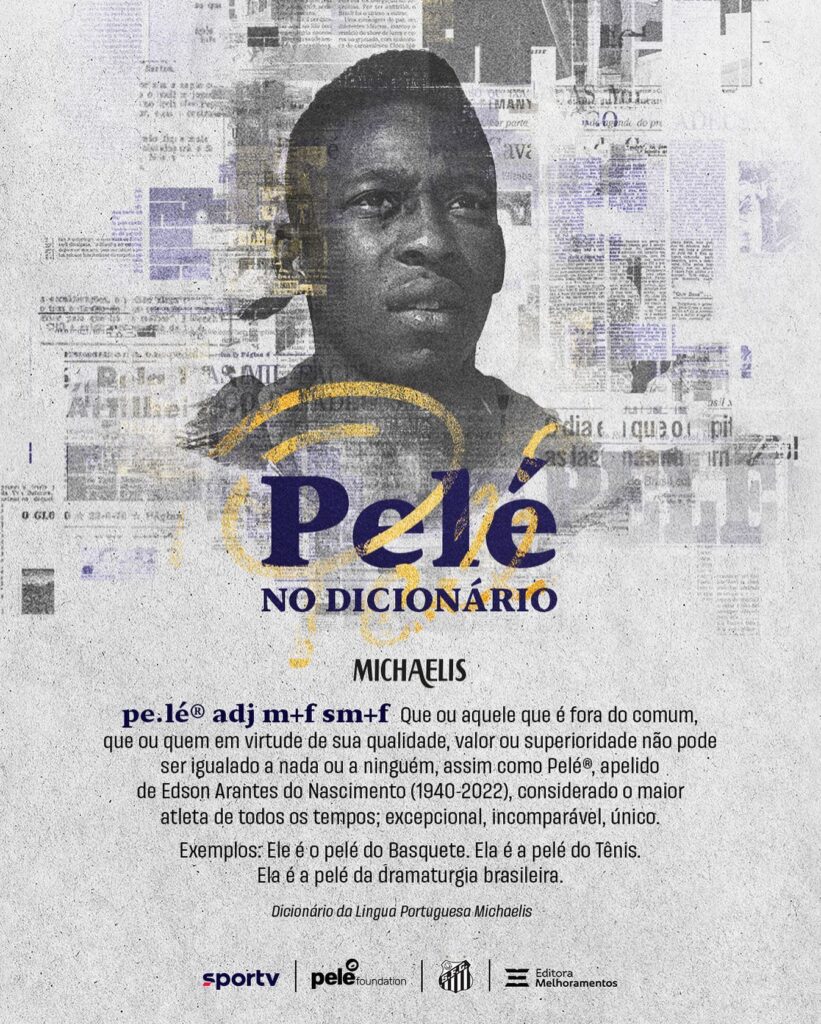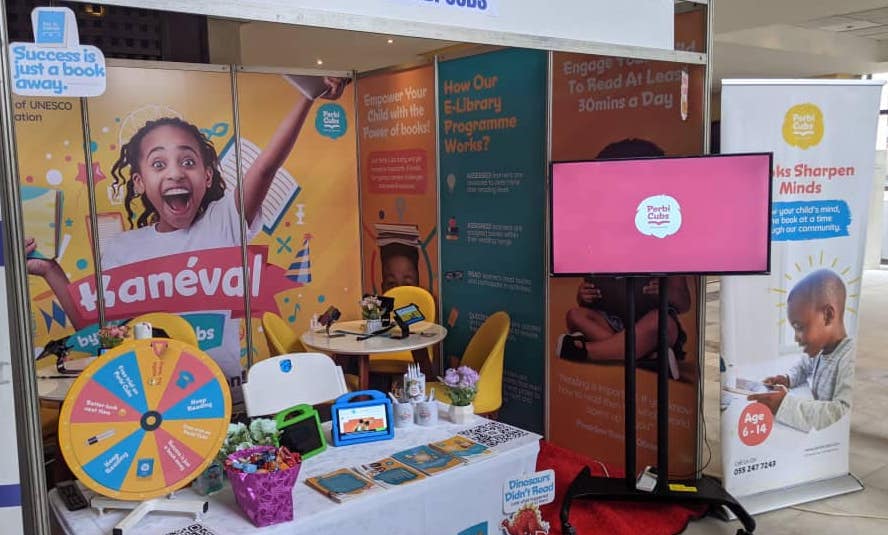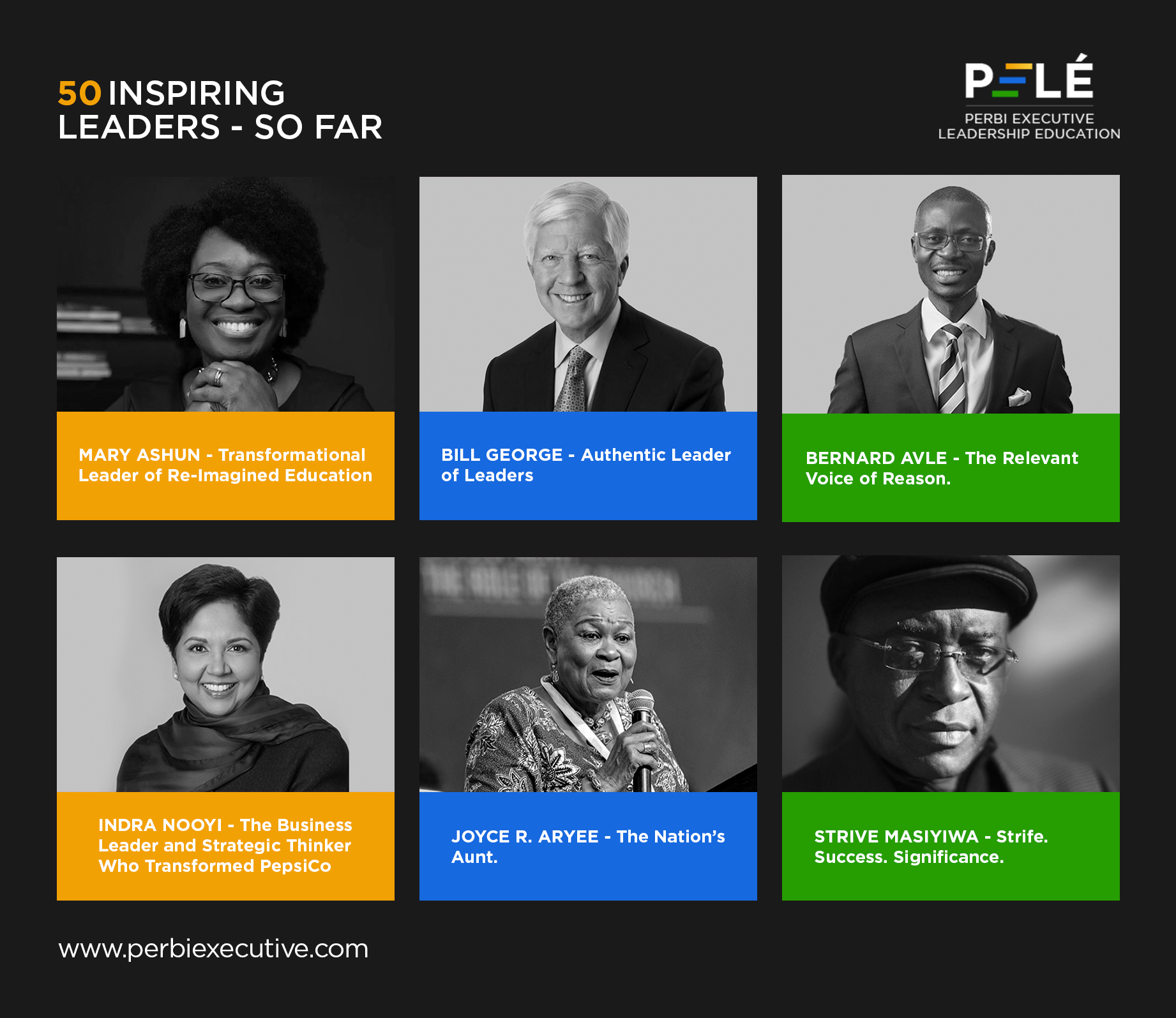
50 Inspiring Living Leaders
Dear Leader,
If you haven’t yet checked out the first 10% of the 50 Inspiring Living Leaders on the Perbi Executive Leadership Education (PELÉ) website, catch up quickly and get some oxygen for you leadership journey:
1. STRIVE MASIYIWA—Strife. Success. Significance: https://perbiexecutive.com/strife-success-significance…/
2. JOYCE ARYEE—A Nation’s Aunt: https://perbiexecutive.com/a-nations-aunt-joyce-r-aryee/
3. INDRA NOOYI—The Business Leader and Strategic Thinker Who Transformed PepsiCo: https://perbiexecutive.com/indra-nooyi-the-business…/
4. BERNARD AVLE—The Relevant Voice of Reason: https://perbiexecutive.com/bernard-avle-the-relevant…/
5. BILL GEORGE—Authentic Leader of Leaders: https://perbiexecutive.com/bill-george-authentic-leader…/
6. MARY ASHUN—Transformational Leader of Re-Imagined Education: https://perbiexecutive.com/mary-ashun-transformational…/
This 50 Inspiring Living Leaders series highlights current influencers who are succeeding in leadership, integrity, family or entrepreneurship in whatever field and exhibit most, if not all, of our values of PELÉ. We value people, growth, particularity, excellence, success, authenticity and significance. These stories are largely written in terms of growth, success and significance in leadership, integrity, family and entrepreneurship. While we do our best to receive personal references about each leader, most of our research and writing is based on literature review of publicly-available information. As authorities in leadership, we are fully aware that there is no such thing as a perfect leader, and leaders may have their flaws, but we choose to celebrate these inspiring living leaders for their achievements outlined in our series. Having said that, should you happen to have any incontrovertible evidence that any of our featured leaders does not fit our bill of an authentic leader, please write to us at info@perbiexecutive.com. Our vision at PELÉ is a flourishing global ecosystem of authentic leaders characterised by healthy growth, holistic success and lasting significance.

The Inadvertent Lid of Political Leadership: My One Regret and Heartache.
It’s been a very busy few weeks. The last one in particular was the kind that Nelson Mandela would call “‘impossible’ until it’s done.” The very morn of the dawn I arrived back in Accra from Kenya, the first day of the work week, I had to be speaking at about 10am at an African Young Professionals Conference. That same week my team at PELÉ and the Ghanaian contingent of the African-wide BCA Leadership hosted the power-packed, two-day Made in Africa Leadership Conference (MLC) from June 13 to 15. Then there was a Youth Rally in the vicinity of the University of Professional Studies (June 15 evening) where l was billed to speak as well. And then to crown that week, The HuD Group, which I founded with eight of my friends in 2003, held a press launch of our twentieth anniversary and simultaneous launch of three legacy projects.
In all of this business and busyness, one thing that has come through very clearly is that leadership is absolutely important–that everything does rises and falls on leadership. I tried to make that point in my opening remarks to the distinguished ladies and gentlemen convened at the Marriot for the aforementioned MLC 2023. Even this morning, as I was training the executive team of one of our PELÉ clients, a tech start-up, Maxwell’s Law of the Lid came to the fore: leadership is the lid on their personal level of effectiveness as well as the organization’s impact that it would ever make.
Leadership is so important that every professional must have it, everyone in every sector of the economy must possess it, and everyone at every level of society must have it but especially leadership is too important to leave it to politicians alone. “Leadership is cause,” as one other leadership expert puts it, “everything else is effect.”
As we celebrate 20 years of The HuD Group, we can testify that God has done amazing things in, on, with and through The HuD Group. We started in Ghana, moved to Cote D’Ivoire, then to Nigeria and Canada and now have a presence in 24-25 countries on all continents, having incredible impact on people in every sphere. In fact, at the anniversary launch last week Friday, several VIPs like celebrated, young, award-winning journalist Manasseh Azure Awuni, shared how The HuD Group had impacted them. But I shared with the audience my one regret: that in all this 20 years of The HuD Group we did not give enough attention to the political space in particular. Of course, it is not that we did nothing at all but knowing what l know now and seeing how successes in all these other areas of life have literally been eroded by what has happened in the political space, especially in Ghana, that really breaks my heart.
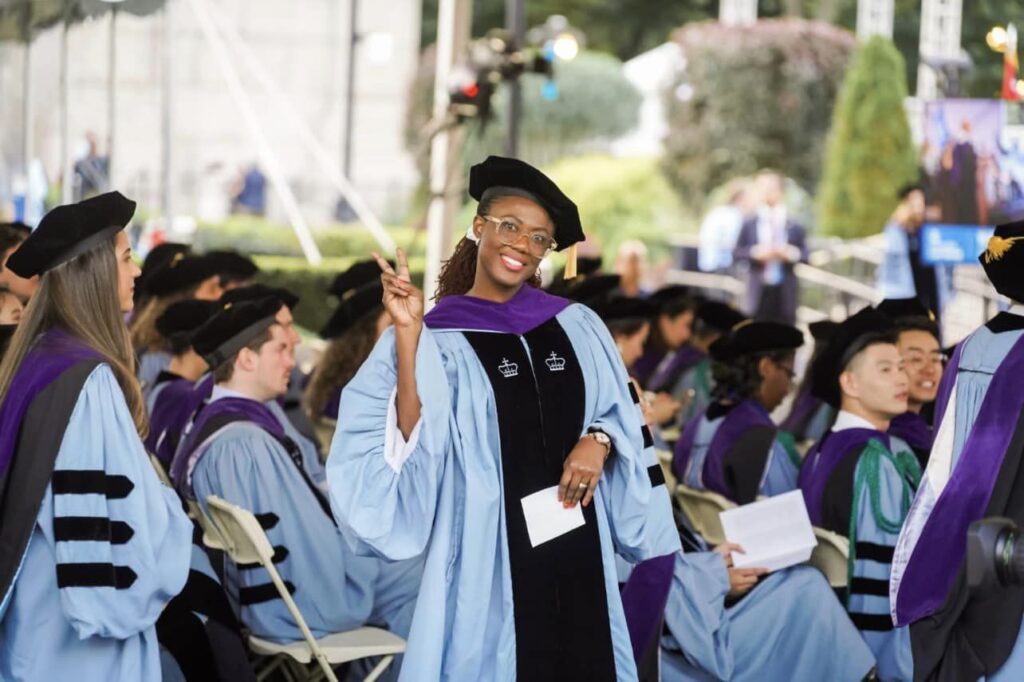
This brilliant friend just graduated from Columbia Law School. I told her I was going to share this beautiful photo on social media as it illustrates my frustration that a lioness like her will be returning home to Ghana only to be led by goats.
THE SKY ISN’T THE LIMIT; POLITICIANS ARE
This has been a season of lots of graduations. I’ve seen flashy photos from Harvard to Fuller, and been physically present at inspiring commencements like Ashesi’s about three weeks ago. First, I’ve been excited about all these amazing graduates bustling with energy and vision and drive, some having done some earthshaking capstone projects and all. Yet all these amazing people formally graduated by our best academic establishments and semi-formally by The HuD Group in the last 20 years—and yes, some of us have been though all kinds of fellowships from Aspen and Eisenhower to Tutu—are restricted by what happens in the political space because everything rises and falls on that leadership. Political leadership is the lid over all our collective effectiveness and greatness.
If anyone told these graduands that the sky is the limit, that isn’t wholly true; our political leaders are. No I’m not a whiner; I am precisely the opposite of that, which is why I’m a serial entrepreneur. So I believe in creative ways around ‘the system’ but as the august chairperson of the HuD anniversary launch, Madam Yawa Hanson-Quao, had earlier said at the MLC, “We cannot entrepreneur our way out of bad governance.” Political leadership is the lid over all our other attempts at leadership.
Political leadership is the lid over all of our collective effectiveness and greatness in all of our fields of work and spheres of influence. We’ve got to get up and take the political space seriously and not let anyone who is not a selfless, authentic, transformational leader make their way there! Because then, it doesn’t matter how the collective brilliance of all of us is, there would be a lid over the rest of us. A good illustration is the proverbial army of sheep led by a lion versus or an army of lions led by a sheep.
At the end of the day, every sector, and every level of our society needs at least good leaders, even better, great leaders! Otherwise like John Gardener aptly puts it, “The society which scorns excellence in plumbing as a humble activity and tolerates shoddiness in philosophy [or politics for that matter] because it is an exalted activity will have neither good plumbing nor good philosophy: neither its pipes nor its theories will hold water.”
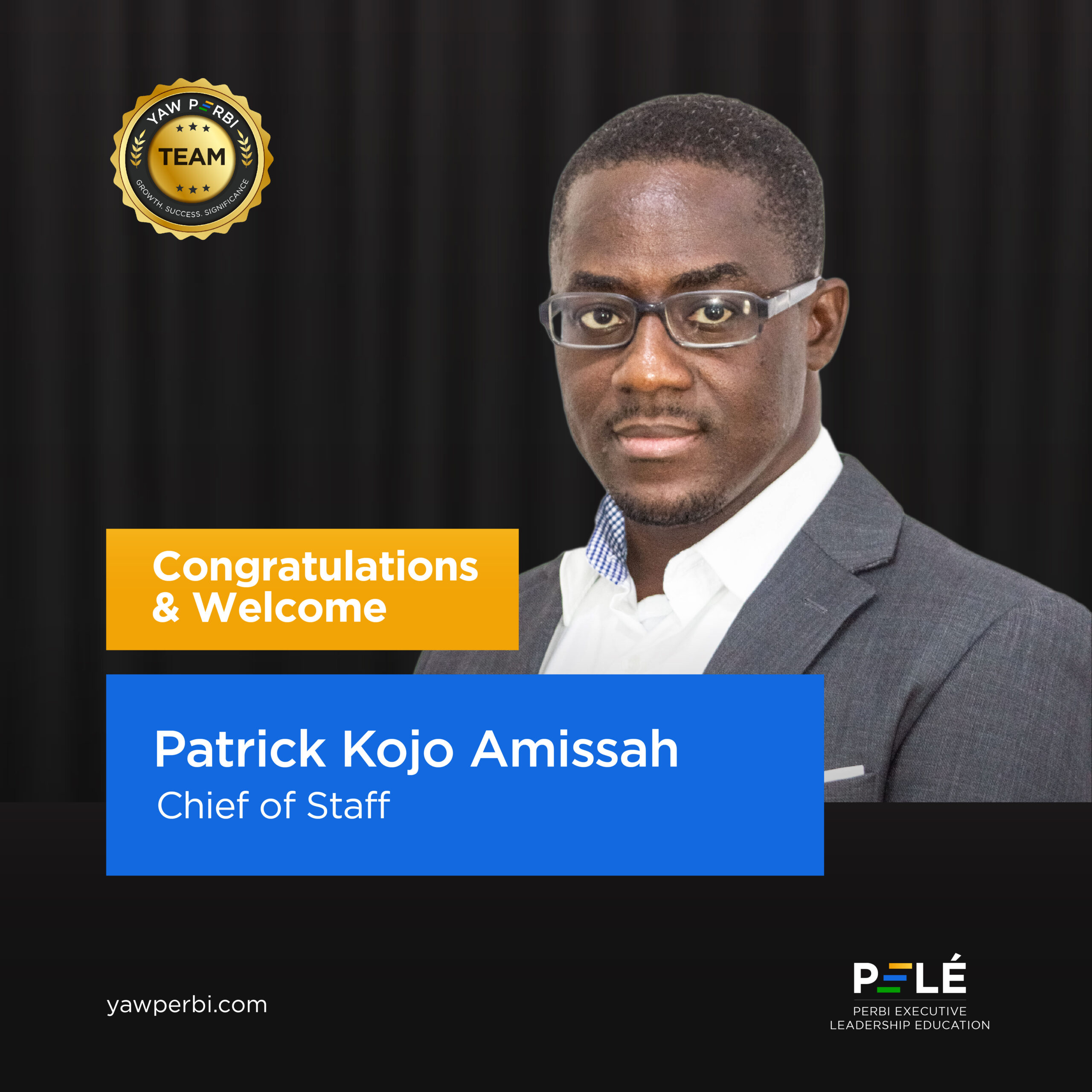
Perbi Executive Leadership Education (PELÉ) Gets New Chief of Staff: Introducing Patrick Kojo Amissah.
Perbi Executive Leadership Education (PELÉ) and allied Perbi establishments heartily welcome Mr. Patrick Kojo Amissah as our new Chief of Staff. Kojo Amissah is a versatile professional with experience in organisational leadership, team and operations management. He believes in striving for excellence and critically analysing problems with the goal of coming up with practicable, innovative solutions. He has worked in the educational, publishing and financial sectors.
Kojo’s previous work experience includes co-managing a start-up (Catalyst Learning Limited) and growing it into a sustainable firm. His responsibilities included structuring and establishing different roles and tasks, recruiting and training staff, establishing systems, managing finances, and planning and executing projects. For over three years he led in the development, printing and distribution of over five million copies of textbooks and workbooks to various schools across Ghana. He managed communications and relations with foreign printing firms including negotiating prices and planning the delivery of printed books.
We are convinced that the skills and knowledge gained from these experiences will enable him to quickly adapt to the demands of the Chief of Staff role at PELÉ and to exceptionally perform the outlined responsibilities. Mr. Amissah possesses good leadership and team management skills which he honed while serving as Team Leader, Curriculum Development and as Chief Operations Officer. Watch out for PELÉ’s online leadership courses to be launched by mid 2023.
Mr. Amissah developed important team building and conflict management strategies as he directly and indirectly managed over thirty individuals performing different roles. He also possesses good negotiation skills and valuable stakeholder management experience. At PELÉ, we believe these are important transferable skills that will aid his interactions with staff of Perbi Executive Leadership Education and affiliated organisations like Perbi Cubs, Kwiverr, The HuD Group, Send Africa, Adeshe Real Estate, ISMCanada, PAIS, Africa to the Rest, BCA Leadership, the Lausanne Movement etc. Kojo takes the baton from Ashesi cum University of Warwick alumna Araba Andoh who laid pioneering tracks for the role.
According to Kojo, “I am highly motivated to serve in the role because it provides the opportunity for me to put my unique mix of experience in leadership, operations management and publishing to use in the worthy cause of growing executives to make significant impact in society. I also believe that working directly with an accomplished leader and entrepreneur like Dr. Yaw Perbi is an unmissable opportunity to grow professionally.” Among Kojo’s first tasks will be helping to host the incoming BCA Leadership Made in Africa Leadership Conference, launching PELÉ’s avant-garde DeepLEAD online leadership course and providing operational support for both The HuD Group’s 20th anniversary activities and Kanéval by PerbiCubs/UNESCO Accra World Book Capital. In commemoration of the latter, Dr. Yaw Perbi seeks to (re)publish all his two dozen books.
We welcome Mr. Kojo Amissah at this inflexion point where YAW PERBI is transitioning to PELÉ (Perbi Executive Leadership Education) to maximize team potentials beyond the availability and capability of Dr. Yaw Perbi as an individual. PELÉ by YAW PERBI is an Executive Education firm that offers authentic and customized relationships and resources to C-Level executives to grow personally, succeed professionally and become significant societally. PELÉ’s vision is to see a flourishing global ecosystem of authentic leaders characterized by growth, success and significance.
Kojo wields a Bachelor’s degree from the University of Ghana and an MBA from Coventry University. He is a practising catholic. Akwaaba, Kojo. Bienvenue, Monsieur Amissah. Here’s to your own growth, success and significance. Together, let’s carpe diem and make a dent in the universe!

Introducing PELÉ (Perbi Executive Leadership Education).
Imagine a flourishing global ecosystem of authentic leaders characterized by healthy growth, holistic success and lasting significance. That’s the big dream and eternal hope fuelling our daily tasks at the Executive Education firm that bears my name, YAW PERBI. A couple of years ago, after eight years as President & CEO of a Canadian non-profit in the international education space and having garnered several years of executive leadership experience in the Ghanaian military and medical fraternity, global media, the United Nations in Cote d’Ivoire etc. I decided it was time to serve all of that to leaders of leaders: the C-suite. So I came out of sabbatical and stepped down as President of ISMCanada to do this.
Since according to my mentor of a quarter of a century, John C. Maxwell, by whom I’m officially a certified coach, speaker and trainer, that “one is too small a number to achieve greatness,” I have been steadily growing a global team of competent, caring, confident and character-based co-leaders on/from every continent in the world beyond myself to make our faith, sight. That journey has culminated in the birth of PELÉ.
A Play on Words
In keeping our focus on growing and coaching executive leadership to succeed, ever broadening the authentic relationships and resources we bring to bear on our task, we decided to move away from YAW PERBI specifically and to build Perbi Executive Leadership Education, PELÉ for short. PELÉ is not exactly just a happy coincidence, for as a once-upon-a-time football fanatic and soccer player for my elementary school, I recently engaged in my fair share of arguments about who the greatest soccer player of all time is between the shouts in favour of Lionel Messi after lifting the Qatar World Cup trophy on December 18, 2022 and the incessant calls to hallow the legendary Edson Arantes do Nascimento, better known by his nickname Pelé, who died eleven days later on December 29. As a double childhood hero—both of my dad and myself—I had been pondering a way to honour a Black man who gave everyone so much delight and so many people of his skin hue so much pride.
As I’ve stated before, “I am eager to particularly provide C-level executives of African descent with the paradigms, processes and tools necessary to maximize their potential, to be world class, take the world stage and make their dent in the universe.”
A Word In Play
Then came April 2023 when the Pelé Foundation and Sportv launched the “Pelé in the dictionary” campaign to pay tribute and recognise his legacy in other fields beyond sport. Of course his name has long been a synonymous with success and excellence, both of which are values of our Executive Education company, but now the great Brazilian forward and only human to have lifted three World Cup trophies officially had his name in the Portuguese dictionary. The adjective “Pelé” has been added to the Portuguese edition of the Michaelis dictionary to describe “someone out of the ordinary.”
Pelé, the nickname of the late football legend, has officially become tantamount to “extraordinary, exceptional, incomparable, unique.” Pelé is an adjective for something or someone that is out of the ordinary, one who by virtue of their quality, value or superiority cannot be equalled to anything or anyone, just like Pelé. For example, he is the Pelé of basketball, she is the Pelé of paediatrics.
What’s in a Name?
According to Emily Olson of NPR, “It was in the small, impoverished town of Bauru where he first got his nickname playing in youth leagues.” Apparently, even Pelé himself wasn’t sure where it came from, he wrote in a 2006 piece for The Guardian, but it may have been a play on Bilé, the nickname of a goalkeeper for the team Pelé’s father played on. “I can remember the name really bugged me at first. I was really proud that I was named after Thomas Edison and wanted to be called Edson,” he said. “I thought Pelé sounded horrible. It was a rubbish name. Edson sounded so much more serious and important.”
PELÉ by YAW PERBI is an Executive Education firm that offers authentic and customized relationships and resources to C-Level executives to grow personally, succeed professionally and become significant societally. To this end, the company provides Pelé services in leadership development, management training, executive coaching and publishing. Our Pelé coaching, authoring, speaking, and training are centred on LIFE—Leadership, Integrity, Family, Entrepreneurship.
Conclusion
We are PELÉ–extraordinary, exceptional, incomparable, unique–but more importantly, we form PELÉs, who are authentic, out of the ordinary executive leaders in every sector of life and all society’s centres of influence. As a forward-looking, authentic leader, if you want to dextrously dribble through LIFE and exceptionally hit goals like the legendary Pelé, you know where to look for the kind of coaching and training it will take: Perbi Executive Leadership Education (PELÉ). Like begets like.
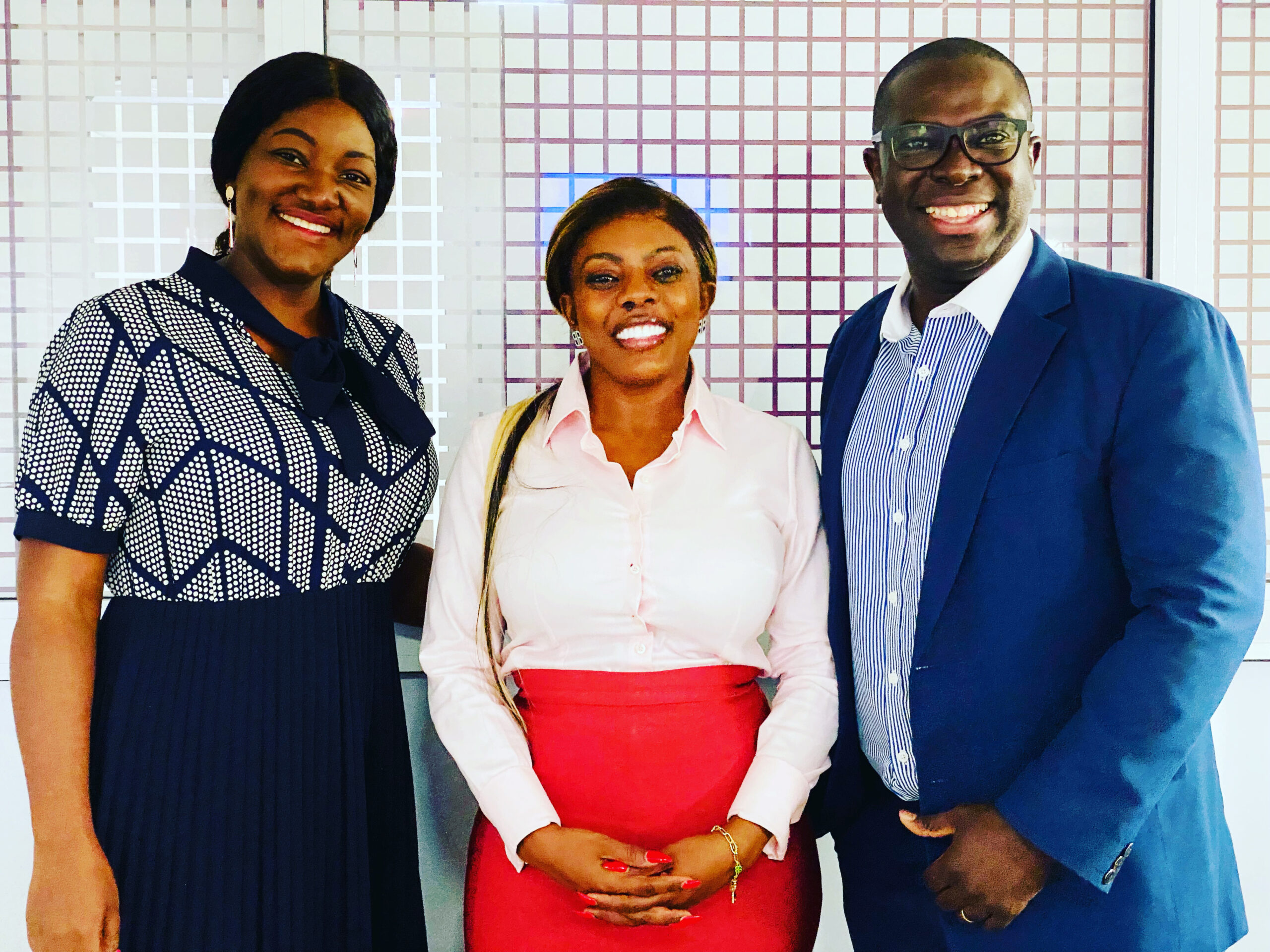
Of Kanévals, Kanébals & Kanévores.
Co-founders of Perbi Cubs sandwiching Kanéval partner-influencer, Nana Aba Anamoah, media personality & General Manager of GHOne TV/Starr FM.
This year, the capital city of Ghana where my wife hails from and where I was born has been named by UNESCO as its twenty-third World Book Capital. Accra takes over from Guadalajara, Mexico (2022) and will be handing the baton to Strasbourg, France come April 2024. Since ‘kané’ is the Ga word for read—and Ga being the language of the Accra people—Perbi Cubs Library services creatively replaced the near-homophonic ‘carni’ in ‘carnival’ with ‘kané’ and coined the word ‘Kanéval’ to bring fun to reading, which is otherwise unfortunately perceived widely as a bore and a chore.
As official partners of UNESCO Accra World Book Capital 2023 (AWBC ‘23), Perbi Cubs will be organizing Kanéval as a fantastic year-long program, a traveling fun fair transitioning from place to place with lots of amusements intertwined with lots of reading. You will find a fuller history of the UNESCO AWBC’23 partnership and details of the year-long fiesta here.
RESCUE FROM KANÉBALS
We are of the conviction that this Kanéval social service campaign needs to involve key influencers from all walks of life, from CEOs to Black Stars players to musicians, to consistently show that reading is fun and leads to success. The campaign will consist of various events in-person and online, including book fairs, storytelling sessions, and community outreach programs. By making reading fun and accessible, we can encourage more people to read and ultimately improve literacy rates in the community.
When we began approaching various influencers to join us on this reading revolution campaign, a massive behavioural change intervention, some of the stories we heard about the generally poor reading attitudes and habits of Ghanaian society were stupefying. We found kindred spirit in Nana Aba Anamoah (photo above), media personality and General Manager of GHOne and Starr FM, who unbeknownst to us had years back initiated a reading campaign known as ‘Raising Readers.’ She too had involved several influencers, including former Ghanaian president Jerry John Rawlings, to read with the children in a certain deprived area of Accra. Book donations in their thousands to the cause were a shot in the arm.
At some point it was clear parental involvement would bolster this behavioural change campaign. Some parent did accompany their children and wards to the reading sessions. Mostly reluctantly. In spite of these mostly illiterate parents sucking their teeth after only a little while, thinking of all the other more ‘productive’ ways they could be spending their time, Nana Aba and team pressed on. In fact, at the height of her intervention they had decided that once a week was not enough for the pace and profundity of the transformation they sought so they decided to leave books with the families and replace them when they returned the week after.
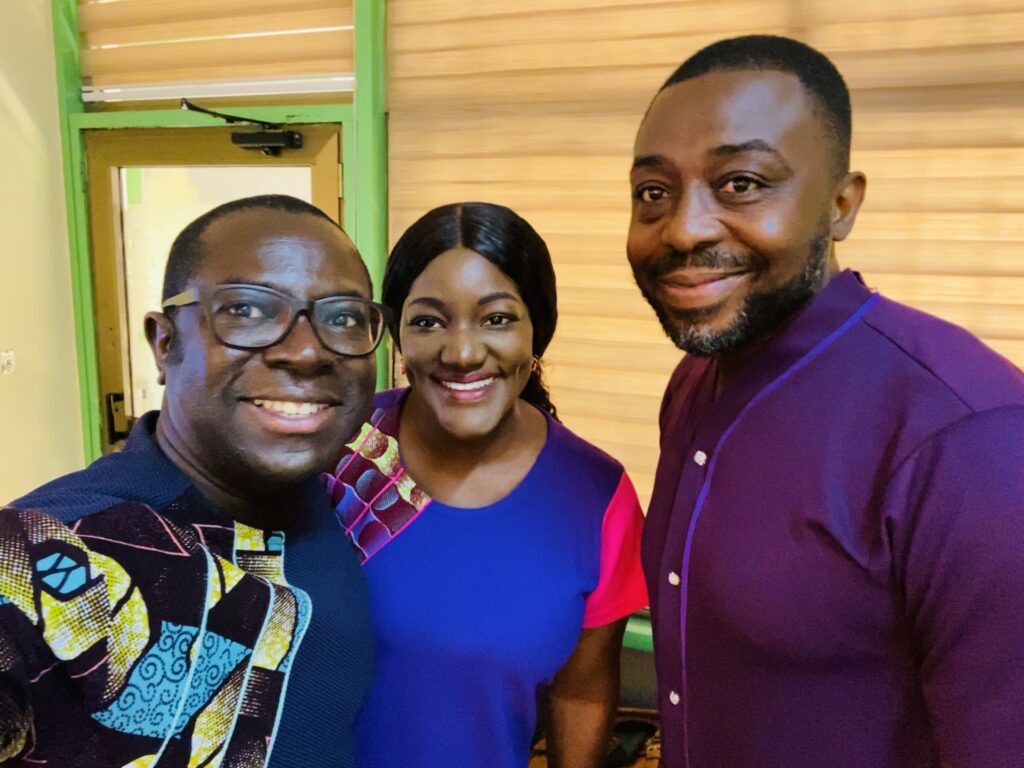
Cofounders of Perbi Cubs with yet another partner-influencer, Kafui Dey, author and GTV Breakfast host
All seemed well and good until the following week when some medical doctors on the Raising Readers campaign team who had gone down the road to grab some snacks returned with horror on their faces. When Nana Aba relates this story, she might not be aware but her face betrays the pain of the let-down she felt. The snacks that the team mates purchased in the catchment area had been nicely wrapped in freshly torn out pages of last week’s books! Kanébals (do you see what I’ve done with ‘cannibal’ and ‘kané’?) had dismembered the hitherto living literary friends, ripping them from their saddle-stitched and perfect-bound spines and repurposing the cadavers as food packaging. Ah!
When we related this story to another influencer on our bill, Kafui Dey (photo above), author and Breakfast host on GTV, he told us worse. Sometimes it’s pages of even the Bible that are Kanébalized for wrapping food!
WANTED: KANÉVORES IN THE KAPITAL
Perbi Cubs, convinced that readers are leaders and leaders are readers, has from inception sought to raise lion-leaders, hence the referral to our 10,000 young patrons as cubs (the young of lions) rather than the typical ‘kids’ (the young of goats).
By the end of the year-long Accra World Book Kapital, we seek to have enrolled an army of at least 100,000 cubs who are voracious readers, Kanévores. If carnivorous lions are the king of the jungle, we imagine that Kanévores rule the world.
KALL TO ACTION
According to UNESCO, as of 2021 only 6% of children in classes two and three in public basic schools could read and understand anything they read. Lack of sufficient reading resources and very large class sizes are among the root causes of the problem, but the overarching root cause is that society does not value reading. Reading is seen as a chore, a punishment or even a necessary evil! Yet per credible research, the love for reading is a stronger indicator of a child’s success in school and their future career than even their parents’ level of education and their socioeconomic status.
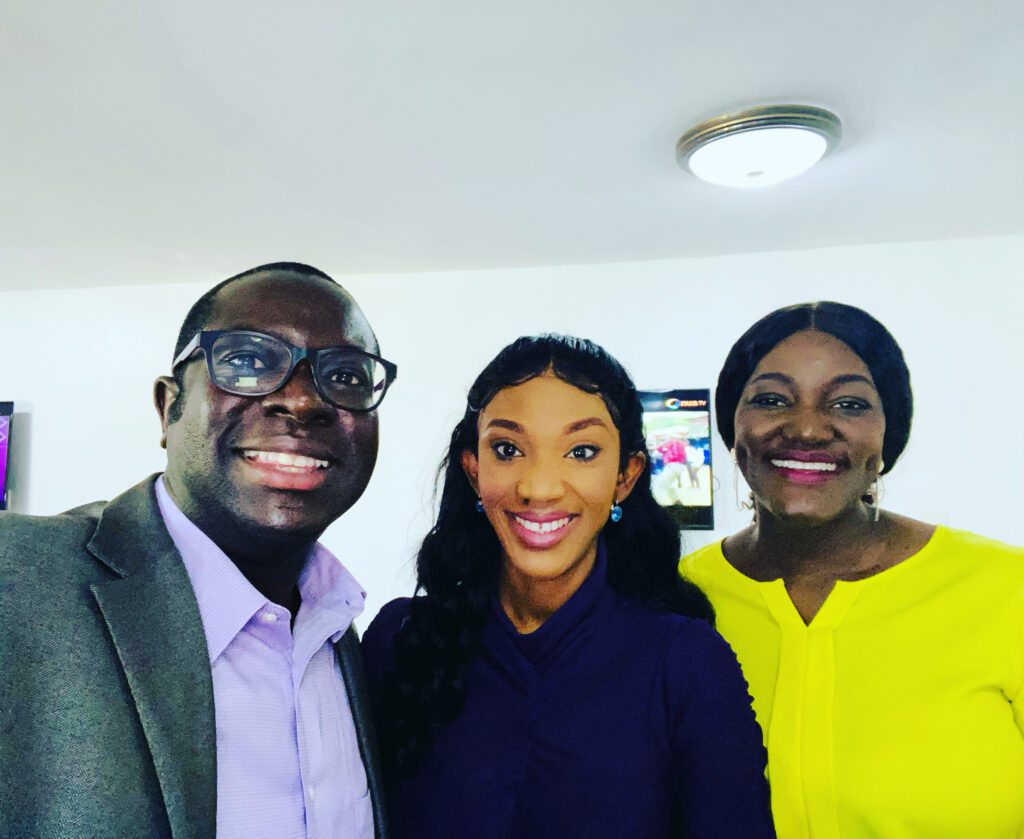
With media personality and reigning Ghanaian Journalist of the Year, Portia Gabor, at the TV3 studios in Accra. Portia’s partnering Perbi Cubs for this vital social intervention, Kanéval!
Join us in promoting the joy of reading and improving literacy rates in the community, particularly among children in public basic schools, by becoming a partner for Kanéval. Together, we can make a real difference in the lives of our community members and future generations. Let’s celebrate and make the most of Accra’s selection as UNESCO World Book Capital 2023.
KONCLUSION
Accra has been selected as UNESCO World Book Capital 2023 and Kanéval is a one-year social service campaign organized by Perbi Cubs, as official partners of UNESCO AWBC 2023, to celebrate this achievement and promote the joy of reading and improving literacy rates in the community.
The success of the campaign depends on a coalition of all stakeholders in the book industry, influencers, and strong partnership with the media. Together, through massive Kanévals all year, we can raise Kanévores and end apathy towards the written word that results in Kanébalism and the like. May readers rise and leaders come to light to transform society and impact the world—from Africa to the Rest.

Confluence for Influence: Kanéval by Perbi Cubs Leverages UNESCO’s Accra World Book Capital 2023.
Exciting news! Perbi Cubs Library Services is teaming up with the United Nations Educational, Scientific and Cultural Organization (UNESCO) and the Ghana Book Development Council, among others, to celebrate Accra World Book Capital (AWBC ’23) as official partners. Accra, the capital city of Ghana, in West Africa, is the 23rd city in the world, and only the fourth in Africa, to have the honour of this title which UNESCO initiated in 2001 to promote literacy globally. This is akin to a literacy World Cup title, only it is bestowed annually.
The World Book Capital is an initiative of UNESCO which recognizes cities for promoting books and fostering reading for a year, starting on April 23, World Book and Copyright Day. UNESCO adopted the 31 C/Resolution 29, in 2001, establishing the World Book Capital (WBC) programme. Cities designated as UNESCO World Book Capital pledge to carry out activities with the aim of encouraging a culture of reading and diffusing the values of literacy, lifelong learning, copyright, and freedom of expression in all ages and population groups, both within and beyond national borders. The first city to be awarded was Spain in 2001 and Accra’s turn is sandwiched between Guadalajara, Mexico (2022) and Strasbourg, France (2024).
The UNESCO World Book Capital Advisory Committee, which evaluates bids to win the title, comprises representatives of the International Publishers Association (IPA), the International Federation of Library Associations (IFLA), the International Authors Forum (IAF) and UNESCO. Past capitals include Madrid (2001), Alexandria (2002), New Delhi (2003), Anvers (2004), Montreal (2005), Turin (2006), Bogota (2007), Amsterdam (2008), Beirut (2009), Ljubljana (2010), Buenos Aires (2011), Erevan (2012), Bangkok (2013), Port Harcourt (2014), Incheon (2015), Wroclaw (2016), Conakry (2017), Athens (2018), Sharjah, (2019), Kuala Lumpur (2020) and Tbilisi (2021).
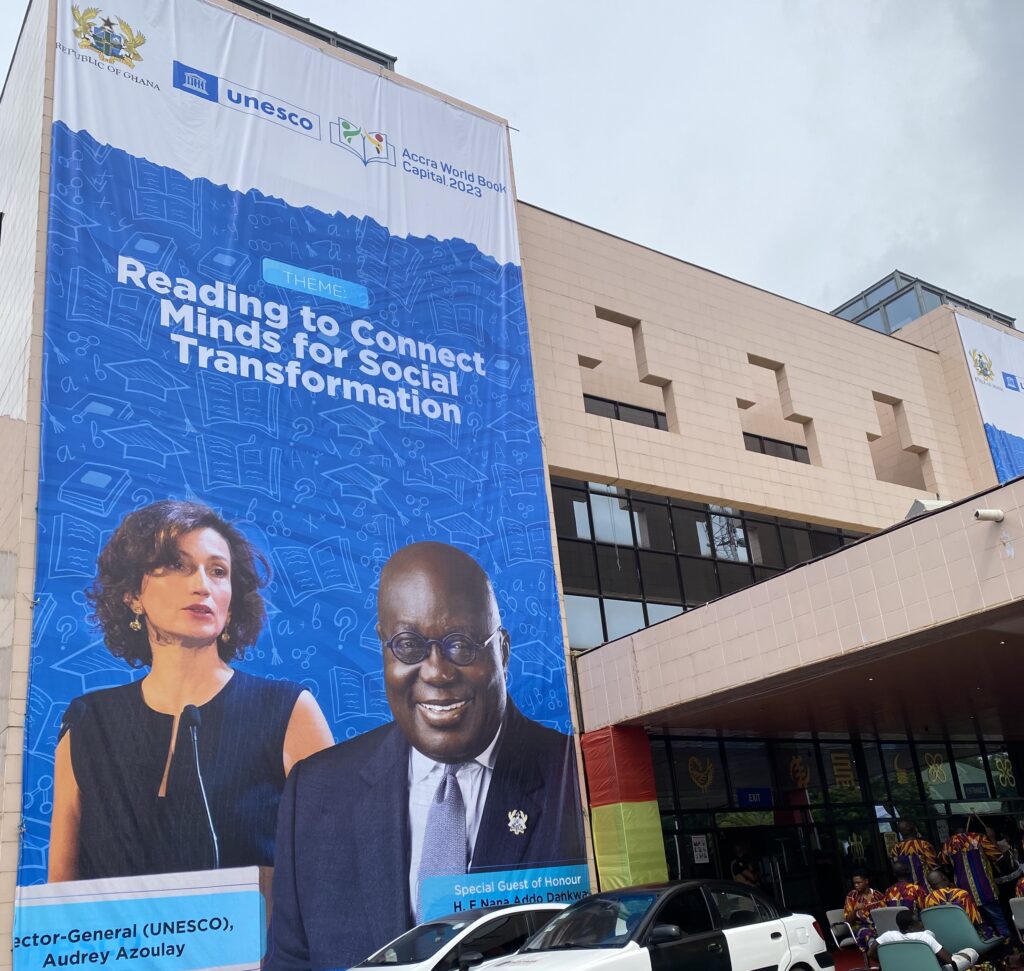
The grand opening ceremony of Accra World Book Capital at the Accra International Centre by the President of the Republic of Ghana
THE GHANA JOURNEY
Accra’s first attempt to win the 2019 World Book Capital title, after the idea was mooted in 2016 and working towards that, failed. Accra relaunched the bid in April 2021 and won it. The executive board of UNESCO, at its 215th session in Paris, France, on September 22, 2021, named Accra the World Book Capital 2023, following evaluation by the World Book Capital Advisory Committee. This was no mean achievement for the ten-member bidding team representing the Accra Metropolitan Assembly, Ghana Commission for UNESCO, Ghana Library Association, Ghana Publishers Association, Complementary Education Agency (formerly Non-Formal Education Division), Ghana Association of Writers, and the Ministry of Foreign Affairs and Regional Integration and chaired by Mrs Ernesticia Lartey Asuinura, the Executive Director of the Ghana Book Development Council (GBDC). Several internal staff of GBDC were behind this successful bid and must be applauded.
According to UNESCO, “the city of Accra was selected for its strong focus on young people and their potential to contribute to the culture and wealth of Ghana. Accra’s proposed programme seeks to use the power of books to engage these young people, as an effective way of skilling up the next generation.” Earlier this year, on April 11, the Minister of Education of Ghana, Dr. Yaw Adutwum, held a press launch of AWBC’23 at which Perbi Cubs was represented by the Founder and CEO, Mrs. Anyele Perbi. He explained that Accra was selected ahead of other cities because the Education Ministry’s programmatic focus was on young people and their ability to contribute to the culture and wealth of Ghana through the power of reading. “Research shows that reading improves the learning outcomes of students in schools,’ said the Minister. “That’s why in certain schools around the world, they’ve implemented and employed the ‘Drop Everything And Read’ – ‘DEAR’. So if it’s 15 minutes, 20 minutes a day, children are made to stop everything and read,” he illustrated.
Dr. Yaw Perbi, Global CEO of The HuD Group and Co-Founder of Perbi Cubs, and Mrs. Anyele Perbi , Founder and CEO of Perbi Cubs, were invited and did attend the grand opening of AWBC ’23 by the President of the Republic of Ghana, Nana Addo Dankwa Akufo-Addo, and the Director-General of UNESCO, Madam Audrey Azoulay Ayoub, at the Accra International Conference Centre. The theme for the occasion was ‘Reading to connect minds for Social Transformation’. It was encouraging interacting with school children as well as top academics at the Perbi Cubs booth, including members of the Ghana Academy of Arts and Sciences. Visiting the exhibition booths of other players in the literacy space was also invigorating but nothing beat the joy of seeing the attending school children flock to the Perbi Cubs stand to sample for a few minutes the thousands of books on their online platform.

Several groups of school children practicalized the whole point of AWBC by doing actual reading at the launch
Under the theme ‘Reading to connect minds for social transformation’ the programmes planned for the title year will focus on particularly the youth and vulnerable groups in Accra (and Ghana at large) such as children, underemployed women, head-porters (kayayei) and persons living with disability, to equip them with literacy and employable skills, while promoting the rich Ghanaian cultural heritage and the book industry in Ghana.
THE PERBI JOURNEY
Both Yaw and Anyele Perbi (née Ampa-Sowa) come from homes full of books. In fact, they got to know each other as children of professors at the University of Ghana campus. Anyele’s dad was an Economics lecturer and Yaw’s mum, a history lecturer. In their growing up years Yaw’s own dad, being a long-time member of the board of Challenge Bookshop, would receive loads of books every year, feeding their home library fat.
Tracing the history of books even further, Yaw’s maternal grandfather was not only an author and professor of African Studies and Ethnomusicology at the same university, but also together with writer and educator Dr. Efua Sutherland organized the first international book fair in Ghana in the early 1970s and proceeded to come together to found Afram Publications a couple of years later, incorporating it in February 1973. Emeritus Professor J.H. Kwabena Nketia was his name.
The Perbi household buzzed with books and moments like when the floating bookshops, the MV Doulos or Logos ships, would berth at the Tema Harbour were fun galore. Meanwhile, Yaw did not like reading as much as Anyele in their early years on the Legon campus. Anyele LOVED reading to the point that the rate of buying books for her and her two brothers was threatening to bankrupt her parents. When she was missing from the house you could be sure she was immersed in a book somewhere!
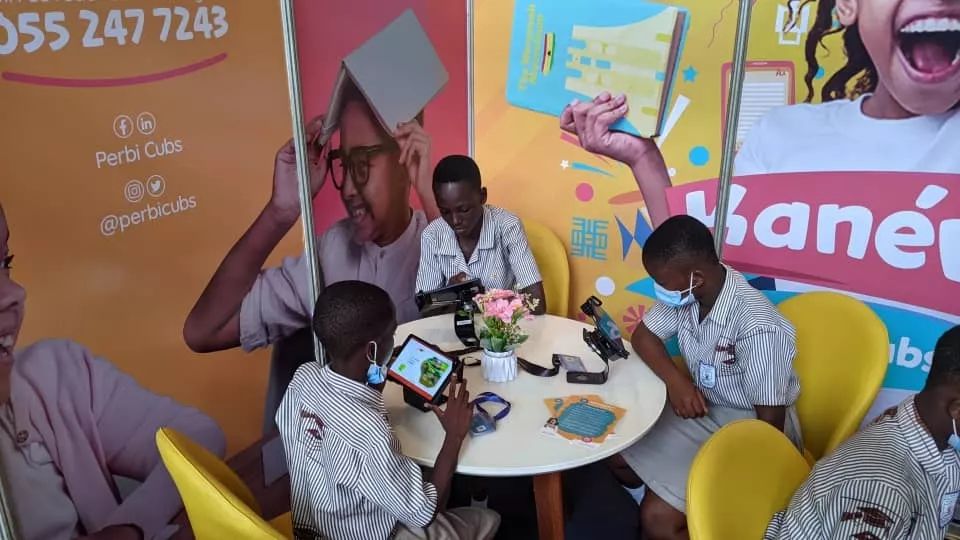
At the intersection of age old reading and new technologies stands Perbi Cubs’ online digital reading platform and offerings
Two jerking statements changed Yaw’s attitude towards books. The first was, “If you want to hide something from a Black people, put it in the book.” You may read the full story here. Fascinatingly, by the age of twenty-three, Yaw would write and publish his first book, What Every Fresher Should Know about University, and as an internationally-recognized author of some twenty books and several book chapters, journal articles etc. now, as they say, the rest is history. Today, one of his punchy books called Read! is subtitled: “You are ‘illiterate’ if you can read but don’t.” Dr. Perbi’s 2015 Thinking Outside the Window was even an Amazon bestseller in its category. His latest book, co-authored with a Kenyan and published in March 2023, is entitled Africa to the Rest. In it, Yaw stresses the need for Africans not only to read but also to write. “Until the lion learns to write,” he reminds us, quoting an old African wise saying, “every tale of the hunt will glorify the hunter.”
When Yaw founded The HuD Group in 2003, one of its first divisions was a library called The Mine (it still runs at the Staff Village of the University of Ghana). So for at least two decades now, Dr. Perbi has been a fierce reading campaigner. And now in tandem with the erudite Anyele, he likes to say “my wife and I have stepped up by stepping down.” What he means by that is, they’ve enhanced their reading campaign (stepped up) but decided to go further down to the age where humans are most pliable: childhood (stepping down). And they began with their our own seven children in the French city of Montreal, Canada which happens to have been the UNESCO World Book Capital in 2005, four years before they would dwell there as a family for the next dozen years. Their own children’s love for reading, the generous 40 books per person supply of the Pierrefonds municipal library across the street from their West Island home and an imminent eight-month visit to Ghana that threatened to stifle this Perbi reading culture combined to birth the Perbi Cubs Library Services. You may find the story and philosophy behind Perbi Cubs here.
AND NOW, KANÉVAL
According to Perbi Cubs CEO, “We are excited to inform you that Perbi Cubs, in partnership with UNESCO Accra World Book Capital 2023, will be organizing a fantastic year-long program. Watch out for Kanéval as it moves round throughout the year, to your school or community. Stay tuned on the various Perbi Cubs social media handles like Facebook, Twitter, LinkedIn and Instagram for more updates.” Kanéval by Perbi Cubs, a season of fun, inspiration, and BOOKS, is launching in Accra on May 11, 2023.
As long as reading remains a chore, we’ll have a problem promoting it. But who doesn’t love a good festival, a carnival? What if we could think outside the box and bring together the idea of a traveling amusement show with merrymaking sideshows, rides, etc. with reading? What if face-painting or getting on a swing was a reward for reading a book? These are some of the disruptive ideas that incubated and eventually hatched Kanéval. The idea of Perbi Cubs in general and KANÉVAL in particular, is to bring FUN to reading while strongly brandishing the connection between reading and success in life.
In the spirit of innovation and creativity, Perbi Cubs values, the coined word Kanéval was inspired by the word for read in Ga, the language of the Accra people, Kané. So combining ‘Kané’ with the English word ‘carnival,’ here we are! There will be lots of fun, reading and other educational activities. Perbi Cubs is grateful to several Ghanaian influencers like Nana Aba Anamoah (media personality and General Manager of GHOne TV and Starr FM), Bernard Avle (Citi Breakfast Show host and General Manager of Citi FM), Kafui Dei (author, speaker and GTV Breakfast host), Portia Gabor (TV3 hostess and Ghana Journalist Association’s reigning Journalist of the Year), Gwen Addo (entrepreneur, author and CEO, The Hair Senta), Giovani Caleb (media personality, radio and TV), Gifty Anti (author, media personality, celebrated journalist) and others who are synergizing with them to take the culture of reading to the next level to transform the fortunes of Ghana and Africa.
Perbi Cubs’ Kanéval is scheduled to take off on 11th May, 2023 at Alpha Beta Education Centres and then to all their partner schools and other communities, particularly deprived ones badly needing a literacy intervention. Kanéval is not just for our Cubs but all our stakeholders including you. There are many activities you can join in with exciting prizes. Kanéval awaits you for a Kanévalistic experience. Kanéval – Reading is fun!!! The amazing part is that in collaboration with various partners, Perbi Cubs is offering huge discounts on their subscriptions so that every Cub in their partner schools can read this year!
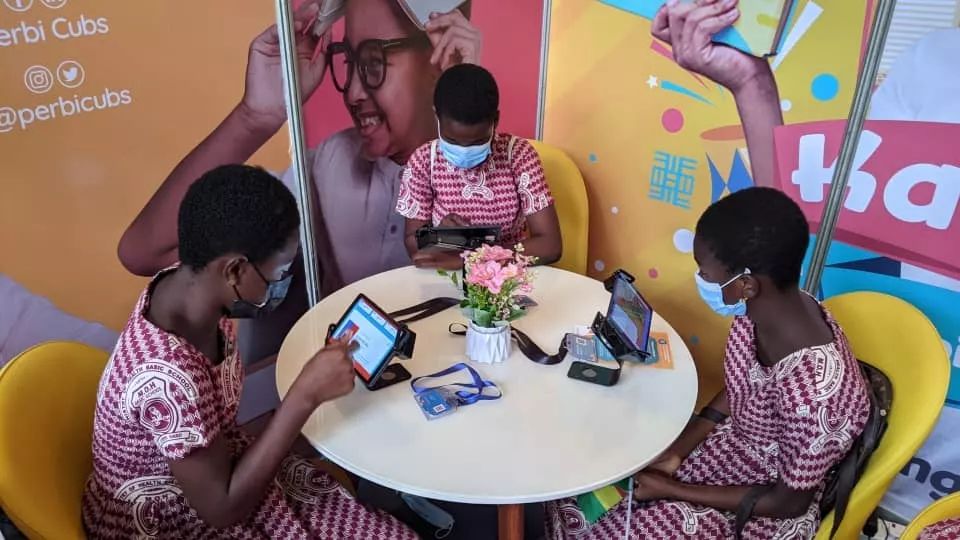
Perbi Cubs has served about 10,000 children so far and is set to scale that in this AWBC year to 100,000
WE HAVE A PROBLEM
Kanéval is fun about something serious. And Ghana in particular has a problem that isn’t funny. As a society we do not value reading enough. If research has proven that the love for reading is a stronger indicator of a child’s success in school and prosperity in life than even their parents’ socioeconomic status or level of education, then we should be worried that only 6% of Ghanaian children at classes two and three can read and understand what they read (UNESCO 2021). Meanwhile the World Book Capital Network (WBCN) acknowledges and reminds us of the power of books and reading as cornerstones to more inclusive, peaceful and sustainable societies. Thus as they rightly put it at Perbi Cubs, “Success is just a book away,” be it personal or national.
Let this be the year we all got dead serious about raising the tide (the general level of literacy) that lifts all the other boats, all sectors and subjects, including STEM. O that the confluence for influence between Kanéval by Perbi Cubs, influencers like those cited above and all other players in the UNESCO’s Accra World Book Capital 2023 space will do the trick. Let’s get on with this serious business, having fun along the way. Kanéval it is!
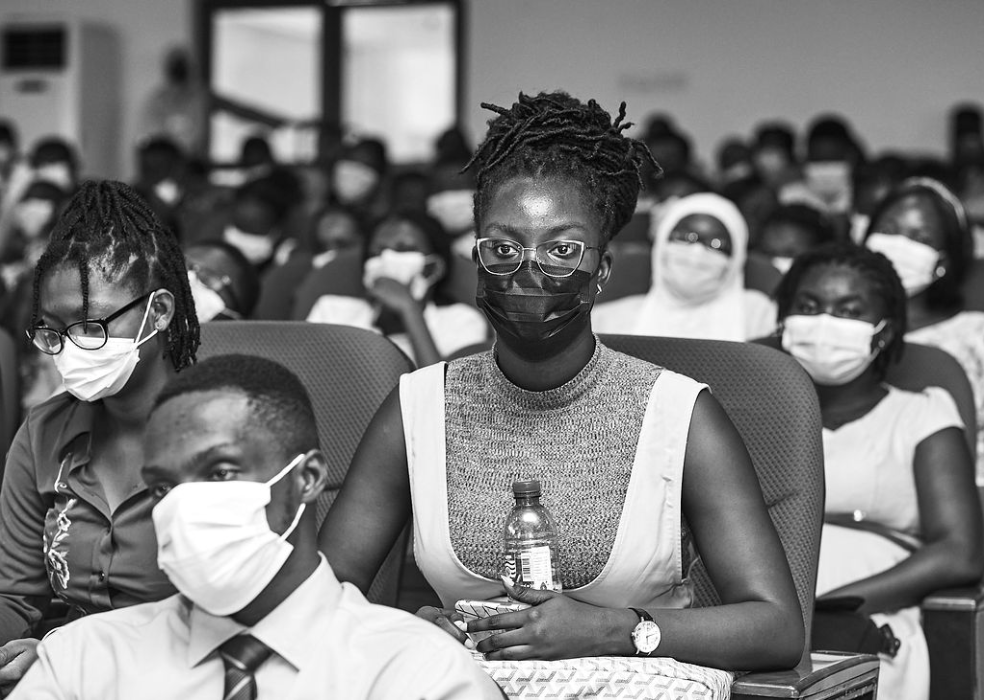
The Ghanaian Dream is Not What You Think
Just before one of my recent trips out of Ghana, I asked the driver who usually takes me to the Accra airport if he would like to go with me for the experience (he’s never been airborne). His response wasn’t what I expected. I admired him for his brutal honesty and was deeply saddened at the same time. He said, “Dr. P, I won’t lie to you. If I go with you, I’m not coming back.” And he is not alone.
As I’ve been interacting with young people in Accra mainly, but in Ghana generally, it seems the Ghanaian dream is: to get out! i.e. to get out of the country to seek greener pastures. The Ghanaian dream is to exit the nation and l find that so sad on many levels. At the same time that excites me. Let me explain.
THE BAD, SAD & MAD
l find it sad in the sense that whatever the push factors are, they are potent enough to drive a collectivist society that is really keen on kith and kin, in other words one in which friends and family mean so much, to want to leave spouse and children, or parents, to go and struggle in another land just to keep body and soul together. What would make many of our people expire in the wilderness, literally die in the deserts of the Sahara en route to Libya and such, or be buried alive in the Mediterranean Sea between Africa and Europe in desperate attempts to get a better life?
Shame on the fathers and mothers who are making life impossible for our young people. I can totally understand why five hundred (500) years, or even two hundred (200) years ago, we would be forced to get into ships to sail to the Americas but today if anybody brought that same ship people will voluntarily fill it en mass and say, “Take me to the Americas, take me to the Caribbean, take me to Europe, take me to wherever. l want to work for whoever, for whatever; just to get out of here.”
I remember being in a conference last year at Cape Town, South Africa when someone did an incredible presentation on what Ghanaians and other Sub-Saharans go through in wanting to reach Europe by all means, literally. It was revealing how a revived craze is trying to go around the Senegambia coast to the Canary Islands, an Atlantic maritime route largely considered “the most dangerous sea passage for Africans trying to reach Europe.” Regarding the Sahara route, one of the funny but sad question was: “How many Africans can fit into the bucket of a Toyota Hilux pickup truck?” They say, “One more!” One more!! They keep filling and filling and filling these truck buckets with human beings and carry very little fuel and food supplies so they can travel light and transport more people. Whenever there is a breakdown or some delay, people die like flies. The dream becomes a nightmare. O WHY?
THE GOOD
On the other hand, what good can there be in all of this, legitimate and illegitimate attempts at migration alike? Why is there some excitement in my heart? There is titillation because God is a global God and he calls people whenever He wants wherever He wants them to accomplish His eternal purposes. Yes!
One day Paul of Tarsus, the lawyer-turned-preacher, was in Athens, Greece and delivered a ‘TED Talk’ at the Areopagus. Luke the doctor-turned-investigative writer records in parenthesis how “All the Athenians and the foreigners who lived there spent their time doing nothing but talking about and listening to the latest ideas” (Acts 17:21). “Ideas worth spreading,” TED would say. But I digress.
One of the things Paul shared was that God who made us all from one original man, Adam, is the one who determines our boundaries, where we live, and in what period or era in history (Acts 17:26-27). People movements are actually God movements. You see that throughout Scripture, from Genesis to Revelation. A personal attestation to this scriptural reality is how I never wanted to leave the land of my birth, Ghana, to be domiciled in another land, especially outside of Africa. I had no such plans. And I married a woman with a similar mindset. We were doubly resolved. Ironically, my wife, Anyele, was born in Canada and moved to Ghana when she was barely two years old but had no desire to return to the land of her birth. In fact, she had never used that Canadian passport to get back to Canada. Two dozen years later.
One evening in August 2006, God spoke to me so clearly. This was barely three weeks after we were married. I was in a Lausanne Younger Leaders conference near Kuala Lumpur in Malaysia when I heard this in my spirit: ‘It’s my world and l send you where I want you.” Huh! Then in January 2008, the LORD spoke very clearly to us both from Genesis 12. It was just our ‘usual’ morning devotion on an ‘ordinary day’ when these words literally jumped off the pages of scripture: “Leave your country, your people, and your father’s household. And go to a land I will show you.” With no such prior plans of ever leaving Ghana to school or work, in a dramatic fashion our lives were turned upside down. By June I was serving with the United Nations Operation in Cote d’Ivoire (peacekeeping soldier) as a military captain and medical doctor to the U.N. staff and troops mainly, and some local Ivorians. By July, Anyele had been ‘kicked out’ of Ghana too to Montreal, Canada, going to pursue her master’s in economics at McGill University. The first time she was back in two-and-a-half decades.
So that’s the exciting part, that God may be calling people to fulfill His grand purposes in the Arab States, Europe, in another Africa country, the Americas, Australasia… wherever. But l pray that we would be able to help those who are going to go well. And also let our contacts in their destinations receive them well. It behoves on the Church in Ghana, in particular (which accounts for over 70% of the population), to find a way to prepare people well, including blessing them with a healthy diaspora missiology, so they may go well and thrive. It cannot be overemphasized that merely getting to America, Europe or China, is no guarantee one will be successful. We give money to poor people in Canada. There are homeless beggars who have come to squat on our property in America. And the poor in the West are not of only one colour of skin.
Having said that, surely we can do more, much more, to help whoever longs to, or is called to, stay in the land of their birth and make it in Ghana, Nigeria or anywhere in Africa, to be able to make it well also, and very well for that matter.
WHAT’S BEST FOR YOU
Find out what God’s great purpose and plan, position and place (including geographical location) is for your life, for the One who made and redeemed you is a global God. It might not be what you thought. Bottomline: You are only going to prosper where God has purposed and planned you to be planted. Make sure you are planted by God in that place–whether it is in Africa or elsewhere–and in that particular period, where and when you will prosper. Think on these things.
Post Script
Here’s a PEP Talk on ‘The Bad & Good about the Ghanaian dream.’
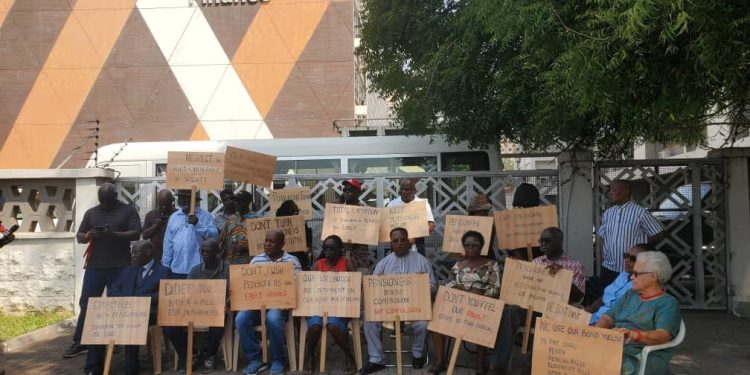
FROM PROFESSOR TO PICKETER: The Lost Generation and the Missing Money
Ghana is neither worth living for nor dying for. That’s how many feel at the moment. Honestly. Think about this: I’ve known Uncle Kweku since his graduate student days on the University of Ghana campus. I was only a lad then. He would later complete his graduate studies, an MPhil in linguistics, and top it up with a PhD from Oregon, USA.
After an illustrious career as an academic (see his brief bio here on the University of Ghana website) he not only retired as a full professor but even served as Pro Vice-Chancellor of Ghana’s premier university. What do we find the illustrious son of Ghana doing these days? Picketing on the premises of Ghana’s Ministry of Finance to demand that the government exempts his and fellow pensioners’ bonds from being sequestered in the dubious Domestic Debt Exchange (DDE) programme. I know for a fact that virtually all of Prof. Kweku Osam’s pension monies are in these bonds. Ei! A former Chief Justice also picketing alongside the other day is reported to have said, “I am over 70 years now. I am no longer government employed, my mouth has been unguarded, and I am talking, and I am saying that we have failed.”
“BACK TO THE FUTURE”
When Uncle Kweku overtly verbalized to the media in an interview on one of the picketing days that he would dissuade his children from ever investing in the Government of Ghana’s financial instruments because “they are risky,” he seemed to have read my mind. Seriously. For while I agree that it is despicable to draw the aged into this DDE debacle and punish pensioners who have planned well for their future and lent their own monies to government to work with, I have an even greater concern for the young people of the country who might take decades to recover from this rude shock. It has taken years to grow a savings and investment culture in Ghana.
As previously started in an earlier article on this matter, “I am pained that, ‘The fathers have eaten sour grapes, and the children’s teeth are set on edge’ (Ezekiel 18:2). For over 20 years now, The HuD Group and I have championed a culture of savings and investments in Ghana, and had the JOY of seeing thousands heeding the call, especially young people.” I recently met one of the young men I used to travel the country with to inspire and teach young people to form investment clubs and start investing. He’s currently the managing director of a major investment company in Ghana. He intimated how this whole DDE disaster made him shed several kilograms over a month, being at the receiving end of verbal and other forms of abuse from frustrated and fearful investors. At the time we spoke, people were withdrawing an average of 100 million Ghana Cedis each day from his outfit. He had already dispatched 2.5 billion Ghana Cedis when we held our conversation.
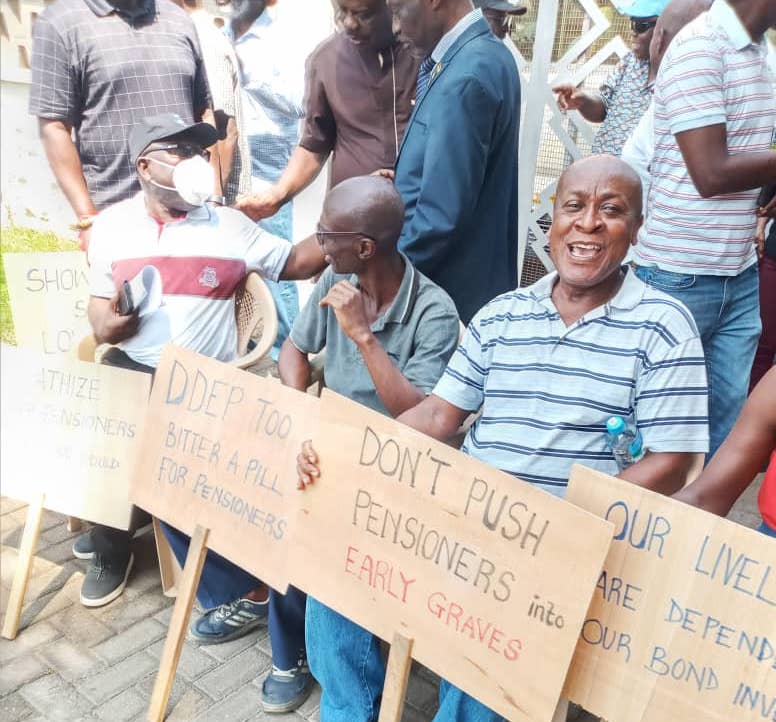
A zoom in on Prof. Kweku Osam, picketing at the Ministry of Finance, with his fellow pension bondholders
BACK TO THE PENSIONERS
So what exactly are we working for? The calibre of pensioners-turned-picketers is disheartening: doctors, engineers, civil servants… If retired professors and chief justices are protesting, what about the no-namers and the many who are too old or too ill to hit the streets? I am privy to a WhatsApp message Prof. Kweku Osam sent that was meant to be just informational, but ended up being very transformational for me:
The last time I took part in a public demonstration against a government of Ghana was in May 1983, as a fresh graduate student. That was when students in the country rose up against Rawlings and his PNDC. Today, God willing, I’ll join fellow Pensioner Bondholders to protest at the Ministry of Finance. The government should leave Pensioner Bondholders alone. Touch not the Pensioner Bondholders.
Think about it: Uncle Kweku began his working life protesting the government. Forty years later, he is ending his working life with yet another anti-government protest. Virtually all his lifesavings is now being held at ransom by a government that has misled and mismanaged her affairs, Covid-19 and Russia-Ukraine notwithstanding. After forty years of wandering in the wilderness between the 1983 protest and the present one on the eve of our sixty-sixth independence commemoration, Ghana itself is a pensioner by age, without much to show for it. We’ve got to do better for our people, old and young alike. Seriously.
Prof. Osam’s generation–my parents’ generation–is the same one the current Finance Minister, Uncle Ken, belongs to. It is the same crop of people who plotted military coup d’etats a generation ago in their youth. Now they won’t exit quietly either, not without a financial coup de grace. With trepidation, dare I call them the lost generation? And they did not only lose themselves and their way, they lost money–theirs and ours.
But to what will my generation and those following rise, having clearly observed that Ghana is not worth living for and Ghana is not worth dying for? That’s how many feel at the moment. Honestly. Think about it.

The Fathers’ Appetites Have Soured the Children’s Futures
The following slightly edited version of this article was first written and posted on Dr. Yaw Perbi’s FaceBook wall on January 31, 2023. At the time, that last day of January was the deadline to tender in eligible Government of Ghana bonds in the controversial Domestic Debt Exchange (DDE). There have been scores of passionate responses to the trending article that we have decided to reproduce it here so people are able to document these for posterity.
I am pained that, ‘The fathers have eaten sour grapes, and the children’s teeth are set on edge’ (Ezekiel 18:2). For over 20 years now, The HuD Group and I have championed a culture of savings and investments in Ghana, and had the JOY of seeing thousands heeding the call, especially young people. Financial Whizzdom, is what we called the campaign.
I wrote three personal finance books and executed a triple launch of Financial Whizzdom, Financial Whizzdom Nuggets (a summary) and Financial Whizzdom through Investment Clubs. It was around that time that Uncle Ken became a mentor to me. He was intrigued that a medical student would be so adept at the world of finance. He not only loaned us some money to finish the project (which we fully paid back within three months or so) but he also passionately spoke at the triple launch. The year was 2004.
Many like-minded people came together to push a savings and investments culture among young people. We traveled the length and breadth of Ghana, doing several seminars and workshops. Medics Investment Club (which really is the first investment club in Ghana per the National Association of Investment Clubs definition) became a model for many who also started their own investment clubs around the country, from university campuses and nursing training colleges to even secondary schools. No wonder I’ve been christened “the grandfather of investment clubs in Ghana.”
The many who wanted to join our investment club at the University of Ghana Medical School but who couldn’t (we had set the maximum for 20) were mobilized into a collective investment scheme we called ‘Mutual Medics.’ At the peak we grew to about 300. We sacrificed student loans, ice cream money and even extra-curricular fun and entertainment to save for our future. Almost none of us have withdrawn the monies we invested almost two decades ago.
Today, January 31, 2023, is the deadline for the trustees of this mutual investment scheme we set up way back in our medical school days to inform Databank for sure whether or not to tender in our eligible bonds in the Government of Ghana’s Domestic Debt Exchange (DDE) debacle. Our fund managers had 70% of the total value of the fund in government bonds, which in normal times and normal places with normal people are supposed to be very low risk, even tempting some advisors to say ‘no risk’ (nothing is ‘no risk,’ not even life itself!).
This DDE is supposed to be a voluntary move but in reality it is a case of “choose your poison.” If you drink this one you will die, if you drink the other one, you will surely die. I am pained for myself, colleagues, fund managers, and the whole investment fraternity in Ghana, especially the younger generation. How did we get here? Indeed, ‘The fathers have eaten sour grapes, and the children’s teeth are set on edge.’
Even more heart-wrenching is that if this should happen under any Finance Minister’s regime, not under the watch of the very mentor who, as far as I know, has spent his whole life building the very financial culture, structures and systems that seem to be now crumbling at his hitherto dextrous hands. The irony.
I am pained. Very much. Whoever has eaten our money, killed our dreams, buried our hope and compelled us to come for unfashionable haircuts that make us look like our misery will have to make it up to us, somehow, even if it is their children or their children’s children. In the mean time, ‘The fathers have eaten sour grapes, and the children’s teeth are set on edge.’ Ah!
~By Dr. Yaw Perbi
Photo credit: Opinion Nigeria
Post Script
We shall do well to document as many of the responses we’ve garnered so far as possible. This issue warrants a national conversation, at the least. A national demonstration for all those equally pained might also be in order to send a strong message to the current government, who in spite of all the pain they are inflicting on the citizenry, have shown no significant sense of regret, repentance or even austerity.

On Saving a Nation.
The story is told of a man who traveled from a developing country to a more economically advanced one in search of a better life. Upon arrival, the man was shocked to find that no one managed the local milk shop. Customers would take what they needed from the refrigerator, leave the exact amount of money for their purchase, and be on their way. Neither the milk nor the money was under lock and key. This would never happen in my country, he thought.
The only thing that surprised the man more than the honor system of the unmanned milk dispensary was the price of the product. The milk was cheaper here, even though his country had more milking cows than people—and in turn produced more milk. How could this be? Then it finally hit him. The higher price at home included the additional costs of dishonesty and thievery.
In his country, locks would be purchased for the refrigerator and money box. A worker would be hired to conduct the transactions. Another person or two would be hired as security, in addition to needing expensive CCTV cameras. This is not to mention the added logistical and utility costs from inefficient or unreliable systems. It all adds up, reflected in the price of a single bottle of milk.
What the society of the man’s home country lacked in cultural values, it paid dearly in economic value—in other words, a higher cost of living than a country with a higher standard of living.
The commercial cost of values
What makes a nation great and strong, ultimately, is its people and their values. Societal values determine what people consider good or important, and this informs how they act. If we consider present-day Ghana in this context, we are likely to be disappointed.
Money and material possessions. Greed and selfishness. These values permeate our society. So I thought it wise to speak to the issue of values in terms of commercial costs. My hope is that even those who place money and materialism and personal gain above all else—including the common societal values espoused in our national anthem and pledge—will realize that real values, such as service and integrity, still affect their bottom line. They will make more money with them, than without.
Consider that Warren Buffet, one of the world’s richest men and most successful investors, advises leaders to look for three things when assessing job candidates: intelligence, initiative, and integrity—but to weigh integrity above all else. If a worker lacks the latter trait, Buffet says, “the first two will kill you. Because if you’re going to get someone without integrity, you want them lazy and dumb.”
It is with near-total trust that we poke an opaque tin of milk and pour out its content without a second thought. We’ve got to trust the regulator, trust the manufacturer, and trust the entire supply chain. A friend and former senior manager in a company that produces perishables once told me that the company would destroy whole batches of product at the slightest hint of compromised quality, because the negative cost of their brand being brought into disrepute would be much greater in the long run than the temporary loss of the thousands of dollars flushed down the drain by an honest act.
Values at the core of a nation
Little drops of values at the individual, family, organization, and sector levels of a society eventually coalesce to make a mighty nation. This is how I have long thought of Ghana. As a mighty nation, rich in social and cultural values to emulate.
I grew up in the early 1990s, when neighboring countries like Liberia and Sierra Leone were decimated by war. Hordes of refugees made their way into Ghana. As a World Vision Youth Ambassador, I toured refugee sites in the country with donors, and the tentative nature of life in tents made me tear up. I have always been grateful to God that Ghana in my life has been an island of peace in a sea of strife.
But bombs and bullets are not the only way to destroy a country. Rather than exploding in external violence, a society can implode through internal valuelessness. I fear Ghana is on this path. I see it all around. We have swung from one extreme to another in a few generations. My grandfather cared little about money or material possessions. He was not alone. How often can we say such things now?
Too often, money and materialism seem to the motivation for the world around us, even at the peril of our lives and at the cost of future generations. Look no further than the dastardly acts of inordinate illegal mining (galamsey), stinky corruption in politics and public service, brazen cheating in exams, rampant illegal practices which combine modern internet-based fraud with African traditionalist rituals (sakawa), food sellers using dirty (waste) water to cook, changing expiry dates on expired medicine or outrightly selling fake medicine… need I go on?
Building the Ghana we want, rooted in values that matter
I worry that in our hurry to catch up with the rest of the industrialized world, we are focusing on infrastructure, industry, and education without a values-based foundation. For instance, STEM education is being touted as the panacea for the challenges we face. But what use is STEM without roots? STEM or any other body of knowledge must grow from a deeply rooted network of shared social and cultural values and norms. Otherwise, patients needlessly die, shoddy infrastructure inadvertently collapses, common funds are looted, and justice is denied.
Ghana is at a crossroads, not just economically, but also culturally. There is a commercial cost to values that must be recognized and incorporated into the policies needed to set Ghana on a more prosperous economic course. Thankfully, influential Ghanaians are talking about it.
Earlier this year, the African Center for Economic Transformation (ACET), which is based in Accra and was founded by Dr. K.Y. Amoako, a Ghanaian, organized a retreat at at the Peduase Valley Resort for more than 50 people representing various civic and political stakeholder groups and organizations in Ghana. The topic of conversation was a new initiative that is set to launch officially in the coming days: the Compact for Ghana’s Political and Economic Transformation.
A roadmap for a stronger democracy and lasting economic prosperity, the Compact is a hopeful approach because it is rooted in strengthening our common values. I attended the Peduase Valley retreat, and values featured heavily in the discussion. It was stressed that the quest for Ghana’s economic and political transformation is meaningless unless it is underpinned by a radical shift in our mindset and values.
Indeed, the discussion focused on identifying values we can glean from the national anthem, the pledge, and the lyrics of “Yɛn Ara Asaase Ni,” written almost a century ago by Dr. Ephraim Amu, one of the fathers of our nation. From the conversation, values such as honesty, selflessness, hard work, and loyalty stood out.
Such discussions must continue in Ghana. Particularly, the all-binding value of integrity needs to be ingrained in every stratum and segment of our national life if we are to realize a greater Ghana, rooted in values that matter rather than tarnished by ones that do not.
Although less dramatic, a definite way to destroy Ghana without bombs or bullets is by eroding the very values that birthed the nation, slowly but surely. “Whether or not this nation prospers,” goes the resounding anthem from Dr. Amu, “clearly depends on the character of the citizens of the nation.”
Dr. Yaw Perbi has practiced medicine in both his home country, Ghana, and with the United Nations Operation in Cote d’Ivoire as a U.N. peacekeeper. He is the founder and Global CEO of The HuD Group, inspiring holistic emerging leadership development in 25 countries on all continents. He is co-founder of PerbiCubs, an edtech company impacting over 8,000 children in Ghana. Yaw is a Fellow of the Africa Leadership Initiative as well as the Aspen Global Leadership Network.

